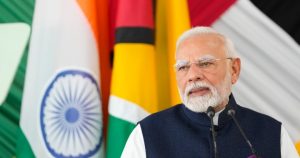Why I stopped making election forecasts
Unlock the US Election Countdown newsletter for free
The stories that matter on money and politics in the race for the White House
In 2016, I was one of the fools who thought people wouldn’t vote for Donald Trump. As I explained to readers before the Republican primaries, “The electorate generally just wants a leader who appears sane, which is why Republicans almost certainly won’t nominate Trump.” I was taking my lead from so-called experts. “If you want to know the future,” I wrote in May that year, “the best forecasters are betting markets . . . The Oddschecker website, which compares odds offered by different bookmakers, indicates a chance of just over one in four that Brits will opt for Brexit. The chances of Trump becoming American president or Marine Le Pen French president are judged a tad smaller.”
This time, I won’t be making election forecasts.
When you are wrong, you need to ask why — especially when you face a similar situation again. Perhaps I’m an out-of-touch elitist who doesn’t understand the suffering of ordinary people, but I’ve come to a different conclusion. In 2016, I still mistakenly believed that most voters were economically motivated, self-interested rationalists. The “rational actor” turns out to be a rare beast.
That creature existed chiefly in the minds of economists. Milton Friedman’s Chicago School assumed that everybody was “homo economicus”, a human calculating-machine who coldly weighs the evidence. Friedman wrote: “We may treat people as if they assigned numerical probabilities to every conceivable event.”
A version of rational-actor theory also pervaded politics. The belief was that people would vote for a competent candidate who promised economic policies that would benefit them. Poorer voters would back candidates promising higher spending, while the rich went for tax cuts. In the US, that’s how Democrats and Republicans used to line up.
Then iconoclastic thinkers, led by Amos Tversky and Daniel Kahneman, demolished belief in rational actors. They showed that people cannot successfully pursue their self-interest, because our thinking is distorted by biases. For instance, we are loss averse: we care more about a potential loss than a potential equivalent gain. We are overconfident, we fixate on the first number mentioned in a negotiation, etc. The psychologist Steven Pinker lists some “traditional ways of evaluating policies, like dogma, folklore, charisma, conventional wisdom, and HiPPO (highest-paid person’s opinion)”.
Trump intuits our irrational biases. He understands that voters respond better to stories than to the repetition of facts and policies. He counters statistics on falling crime with fairy tales about pet-eating migrants.
When I say that voting Trump is irrational, I don’t simply mean that I dislike him. Specifically, he doesn’t propound rational arguments to persuade most voters. Sure, a minority of richer Americans might rationally back him because he’ll cut their taxes. But he’s not offering either competence or policies that warrant a broader appeal.
Most voters have long told pollsters that they prefer Democratic policies, on issues from background checks for gun purchases through abortion to Obamacare. To quote Democratic vice-presidential candidate Tim Walz: “You tell me who in Wisconsin is sitting around saying, ‘Damn, I wish they’d give billionaires tax cuts.’”
Historically, Democratic presidencies outdo Republican ones for growth in GDP, private-sector jobs and the incomes of poor families. The rational, self-interested median American would vote Democrat. But Trump successfully casts himself as a business wizard who can magic the economy.
Like me, the Democrats since 2016 have been learning about irrationality. Whereas Hillary Clinton wooed the rational actor, Kamala Harris laughs and dances. It may work. But if voters are irrational and bad at processing information, writes Professor Anthony McGann, “then it is hard to escape sceptical conclusions about the value of democracy”.
The rational actor has held up better in Europe. The majority of Britons stopped supporting Brexit once the policy’s results came in. And my colleague John Burn-Murdoch has shown that whereas American voters no longer judge governments on economic performance, Europeans still do.
Why are many voters irrational? Pinker says we use rationality much more when running our own lives than when thinking about the wider world. We listen to the doctor before choosing medical treatment. We study the numbers when choosing a mortgage. But rationality isn’t very useful in evaluating distant issues, for instance whether Joe Biden rigged the 2020 elections. That’s because your own worldview (like your individual vote) barely affects anything. Rather, its main purpose is to ingratiate you with fellow members of your tribe. If you live among Trumpists, it’s therefore in your self-interest to believe crazy stuff about pet eating. I’m bearing that in mind this time.
Follow @FTMag to find out about our latest stories first and subscribe to our podcast Life and Art wherever you listen
#stopped #making #election #forecasts





